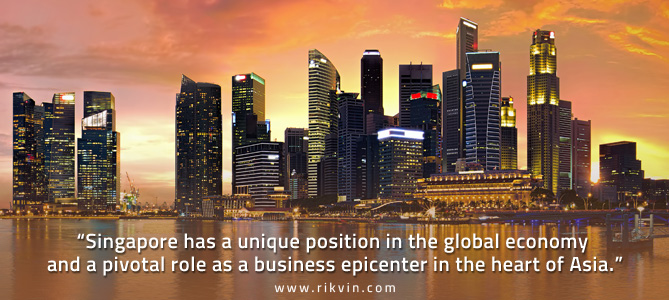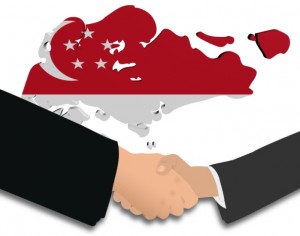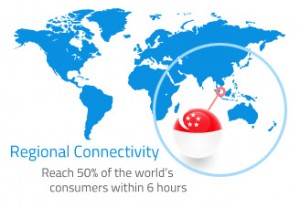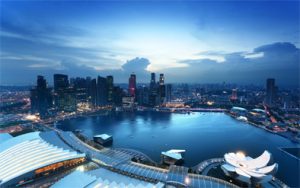Why Singapore is Preferred by Foreign Companies
In this guide, we emphasise the major pull factors that attract many foreign companies to choose Singapore for doing business. Singapore is a prime destination for corporate entities, business leaders, and investors from Asia and around the world. All figures are valid as of March 2019.
For companies that are considering doing business in Singapore, it is a profitable opportunity as it has a unique position in the global economy and a pivotal role as a business epicentre in the heart of Asia. The city-state has been consistently acknowledged as a global business hub – one that features developed infrastructure, political stability, open business policies, a skilled workforce, the use of English as the main working language and respect for intellectual property rights.
Global businesses will find it advantageous to site their headquarters in Singapore. Strong trade and investment make Singapore the most competitive Asian country and the world’s easiest place to do business. Doing business in Singapore offers a doorway to tap into the region’s thriving markets and use Singapore’s prominence as a worldwide business hub, whether you intend to launch a new venture or open a branch of your current international corporation. Working with a professional corporate services provider can be a game-changer for navigating the incorporation process. Moreover, this maximises potential within the Singapore market.
Related Post: Why is Singapore is preferred by the rich and mobile?
Many multinational companies have chosen to do business in Singapore and set up their bases there, alongside 154,000 288,000 small and medium enterprises. Business owners all over the world regard Singapore as an ideal location to grow their businesses, with many of them using the country as a springboard to tap into other emerging markets in Asia.
Singapore has established itself as a reputable financial and regional trading center. It is the world’s busiest port and a top location for investments in the Asia Pacific region. Factors such as strategic location, a competitive workforce, pro-business environment, and forward looking economic policies have enabled Singapore to be the world’s gateway to Asia.
Whether you are a non-resident individual, small and medium company or a multinational, opting for Singapore company incorporation will give you a launch pad to region’s other developing economies. This aside, you can benefit from Singapore’s wide network of trade agreements, ease of doing business, an attractive tax system, and sound intellectual property protection.
So what makes Singapore attractive to foreign firms for doing business there?
Singapore is a unique convergence of the East and West. The social fabric consists of a mix of Asian, European and American influences making it attractive and friendly to the international business community. Since it is a former British colony, its legal and financial structures bear a close resemblance to the US and the UK. Major international banks, multinational organizations and financial institutions all over the world have established their branches in Singapore, often making the country the location of their branch office in Asia. Singapore is called the “Lion City” because of its strong currency and infrastructure which in turn makes it the best place to set up an overseas corporation.
Go Global. Incorporate in Singapore
Singapore is consistently ranked highly in international surveys. Some of its most recent accolades include:
-
- #1 Best business environment in the Asia Pacific and the world: Business Environment Rankings (BER) 2019, The Economist Intelligence Unit
- #1 in the Asia Pacific and #5 in the world for Best global innovation: Global Innovation Index 2018
- #1 in achieving human capital (knowledge, skills, and health) in the world: Human Capital Index 2019, World Bank
- #1 in Asia for effective governance and enforcement of rule of law: Rule of Law Index 2018, World Justice Project
- #2 in the world for economic freedom: Economic Freedom Index 2018, Heritage Foundation
- #2 in the world for the easiest place to do business: Ease of Doing Business Index 2019, World Bank
- #2 most competitive economy in the world: Global Competitiveness Report 2018, World Economic Forum
- #2 in Asia and #7 in the world for best logistics supply chain performance: Logistics Performance Index (LPI) 2018, World Bank
- #2 in the world for best labour/employer relations: Global Competitiveness Report 2018, World Economic Forum
- #3 in the world for best Intellectual Property (IP) protection: Global Competitiveness Report 2018, World Economic Forum
- #3 in the world for the most motivated workforce: IMD World Competitiveness Yearbook 2018
- #4 in the world for the least corrupt economy: Corruption Perceptions Index 2018, Transparency International

1. Ease of Starting a Business
According to World Bank’s Doing Business 2019 report, Singapore has been consistently recognized as the world’s best place to do business in the World Bank’s annual survey of 189 economies around the world.
Compared to many countries that are considered as business hubs, it is easier and quicker to register a company in Singapore as the process takes only one day to complete given all the proper requirements are completed and the application is duly submitted. Owning a company in Singapore can set up by anyone including foreigners. An easy and fast procedure availability of an online system has been made by the incorporation where you can submit your application forms via the internet on-line.
2. Strong Legal System and High Degree of Personal Safety
Singapore has one of the most stable political environments in Asia, offering entrepreneurs and investors a strong sense of security and comfort. Its judicial system has been recognized as one of the most efficient in Asia, enforcing anti-corruption laws so that investors can conduct business without fear of bureaucratic malaise.
Moreover, through strict law enforcement, Singapore has a persistently low crime rate and offers residents a high degree of personal safety. In the event of cross-border disputes, businesses can rely on Singapore’s reputation as a world-class arbitration facility. For anyone looking to do business in Singapore, embracing the various chances that are present in this vibrant market can result in a successful and flourishing venture.
3. Business Friendly Ecosystem

These rankings are a testament to the quality of Singapore’s capabilities and infrastructure. As a result, Singapore has attracted thousands of multinational corporations (MNCs), many of which have chosen Singapore as their Asia Pacific headquarters, says Singapore’s Ministry of Trade & Industry (MTI).
4. Strategic Position and Network of Trade Agreements

Since the signing of the first FTA under the ASEAN Free Trade Area (AFTA) in 1993, Singapore’s network of FTAs now includes 21 bilateral and regional FTAs in force and 41 Investment Guarantee Agreements. Ongoing FTA negotiations with other countries are being facilitated.
These agreements facilitate business and trading across borders and make it less costly for Singapore firms to expand their operations internationally.
5. Extensive Air Connectivity

As of February 2019, the Singapore Changi International Airport serves more than 100 airlines flying to some 400 cities in about 100 countries and territories worldwide. Each week, about 7,200 flights land or depart from Changi, with more than 62.2 million passengers passing through the airport a year. It is also home to many leading logistics firms such as UPS and FedEx.
6. Comprehensive Intellectual Property Protection
When doing business in Singapore, you can rest assured that your intellectual property (IP) is in safe hands. It also comes in a close second in that ranking globally, next to Finland and Luxembourg, which tied for first place. By making Singapore your top choice for doing business, you have access to a thriving ecosystem that values and supports originality and intellectual property.

7. Vibrant Financial Center and Affordable Access to Funding
As of May 2018, Singapore is a vibrant nerve center to 124 commercial banks, 365 fund managers, and 531 capital markets services license holders. It is not only a hub for wealth management and investments in Asia, but has the fourth largest forex trading center, the Singapore Exchange (SGX).
As a result, entrepreneurs are in good stead to have access to a combination of private and commercial banking services to fund the expansion of their business and at rates as low as 1% per annum.
8. Incentives for headquarter setup
Also, to encourage multinational companies to relocate their headquarters to Singapore, the Economic Development Board (EDB) offers regional headquarters (RHQ) and international headquarters (IHQ) incentives. Companies which are conferred the RHQ status enjoy a concessionary tax rate of 15% for qualifying income arising from headquarters activities and operations carried out from Singapore. Those awarded IHQ status enjoy even further attractive tax rates of between zero and 10%.
Regional headquarters which use Singapore as an international intellectual property (IP) holding location may claim writing-down allowance (WDA) for the cost of acquisition of the IP.
9. Foreign income exemption
Another benefit of doing business in Singapore is that Singapore-based holding companies or headquarters can repatriate dividends from their directly-held foreign subsidiaries to Singapore, free of Singapore tax. Those whose foreign subsidiaries are engaged in substantive economic activities but are unable to meet the qualifying conditions for this tax exemption may apply for a specific exemption.
This is because Singapore adopts a territorial basis of taxation. Foreign-sourced income is taxed only when it is repatriated back into Singapore. In addition, tax is not levied on foreign-sourced dividends remitted back into Singapore if – the dividends are received from a country with a headline corporate tax rate of at least 15%, some tax was paid in that country (such as withholding tax paid on the dividends or income tax paid on the profits out of which the dividends were paid), and the exemption is beneficial to the Singapore company.
10. Attractive Personal Tax Framework
The Singapore personal tax structure is progressive. Marginal rates range from 0 – 22% and the framework allows residents to tap various reliefs, thereby lowering their effective payments. Use our Online Personal Tax Calculator to estimate your personal tax.
| PERSONAL TAX RATES (From YA 2017 to YA 2023) | ||
|---|---|---|
| Chargeable Income | Rate (%) | |
| On the first On the next |
20,000 10,000 |
0 2 |
| On the first On the next |
30,000 10,000 |
– 3.5 |
| On the first On the next |
40,000 40,000 |
– 7 |
| On the first On the next |
80,000 40,000 |
– 11.5 |
| On the first On the next |
120,000 40,000 |
– 15 |
| On the first On the next |
160,000 40,000 |
– 18 |
| On the first On the next |
200,000 40,000 |
– 19 |
| On the first On the next |
240,000 40,000 |
– 19.5 |
| On the first On the next |
280,000 40,000 |
– 20 |
| On the first In excess of |
320,000 320,000 |
– 22 |
Source: IRAS
In addition, Singapore offers the Not Ordinarily Resident (NOR) Scheme. It grants a favorable five-year tax treatment for qualifying individuals working in Singapore. Such individuals are employees of a Singapore incorporated company, earn at least S$160,000 per annum and spend at least 90 days per year outside Singapore for work purposes. As such, IRAS will not tax the individual on the income of the duration spent outside Singapore for business.
11. Attractive Corporate Tax Rates
Besides its vast network of free trade and tax treaties, Singapore also offers one of the most attractive corporate tax structures in the world. Although its marginal rate is the third lowest in the world, its effective tax rate is even lower, compared to other more developed countries. The first three years the taxable income of non-resident corporations are exempted from taxes where it is considered a “zero tax” jurisdiction. Avoidance of Double Tax Agreements (DTAs) is also entered into by the Singapore government with other international jurisdictions in order to ensure the country’ financial success and prosperity.
Singapore has an extensive network of Double Taxation Avoidance Agreements (DTAs) with over 90 countries, which comprise three types: comprehensive, limited, and exchange of information arrangements (EOIAs). They also gain from Singapore’s many free trade agreements and the Investment Guarantee Agreements.
Our Singapore Corporate Tax Calculator is made available online to help entrepreneurs estimate their corporate tax rates when they do business in Singapore. Use it to estimate your effective corporate tax rate.
| Timeline of Singapore Headline Corporate Tax Rates | ||||||
|---|---|---|---|---|---|---|
| 1997-00 | 2001 | 2002 | 2003-04 | 2005-06 | 2007-09 | 2010-21 |
| 26% | 25.5% | 24.5% | 22% | 20% | 18% | 17% |
FAQ
- Yes, foreign companies can register a branch office in Singapore. A branch office operates as an extension of the foreign company and does not have a separate legal identity.
- To register a branch office in Singapore, the foreign company must appoint at least one locally resident agent who is either a Singaporean citizen, permanent resident, or an Employment Pass holder. The branch office must also have a registered office address in Singapore.
- The documents typically required include:
- Certified copy of the foreign company’s Certificate of Incorporation.
- Details of the appointed local agent or resident director.
- Registered office address in Singapore.
- Foreign companies with a branch or subsidiary in Singapore must comply with annual filing requirements, appoint an auditor, hold AGMs, and file financial statements with ACRA.
Company Registration for Foreign Companies in Singapore
Start your foreign company in Singapore with Rikvin. Benefit from a supportive business ecosystem and expert guidance for seamless setup.


